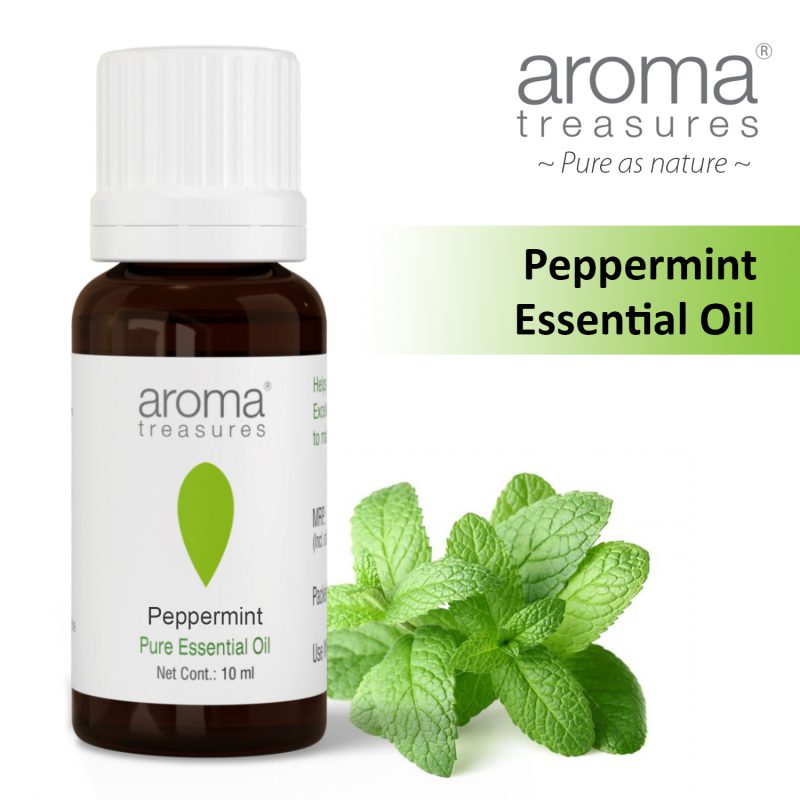Ayurvedic products and herbs, Pudina
Peppermint Essential Oil Uses & Benefits
Wondering how to supercharge your well-being naturally? Discover the incredible peppermint essential oil benefits here & supercharge your well-being.
Peppermint essential oil, derived from the peppermint plant, offers a plethora of uses and benefits that have been cherished for centuries. This versatile essential oil, rich in over 40 different compounds, including the invigorating menthol, serves as a natural remedy and aromatic delight. In this article, we will explore the various peppermint essential oil uses and benefits, discuss how to use peppermint oil safely and uncover its remarkable potential.
Contents
Peppermint Essential Oil Uses:
Peppermint oil’s versatility extends to multiple domains. It can be employed as:
1) A Natural Remedy:
Peppermint oil is known for its therapeutic effects, aiding in conditions such as irritable bowel syndrome (IBS), nausea, digestive issues, common colds, and headaches.
2) Topical Application:
It offers relief from itching, muscle pain, and headaches when applied to the skin, preferably in a carrier oil.
3) Flavoring Agent:
The essence of peppermint enriches various culinary and personal care products like mouthwashes, adding a refreshing twist to your daily routine.
4) Aromatic Sensation:
It serves as a fragrant additive in soaps and cosmetic products, leaving you with a fresh and pleasing scent.
Peppermint Essential Oil Benefits:
Peppermint essential oil, with its long history in herbalism, is believed to have numerous benefits, although not all are scientifically proven. Some of the most compelling benefits with strong scientific evidence include:
1) Reducing Irritable Bowel Syndrome Symptoms:
Research indicates that enteric-coated, diluted peppermint oil can alleviate the discomfort associated with IBS. This chronic digestive condition can cause abdominal pain, diarrhea, constipation, or a combination of these symptoms. Menthol, a component of peppermint oil, may help reduce abdominal spasms by blocking the movement of calcium across the intestinal membrane.
2) Peppermint Essential Oil Benefits Indigestion:
A combination of enteric-coated peppermint oil and caraway oil has been found to reduce indigestion in adults, offering relief from this common ailment. However, it’s essential to consult a healthcare professional if you experience persistent indigestion, as peppermint oil can occasionally cause heartburn and acid reflux.
3) Peppermint Oil May Ease Nausea:
Some studies suggest that inhaling peppermint oil vapor can reduce the frequency, duration, and severity of nausea and vomiting, particularly in specific situations, although a scientific consensus has not been reached yet. However, it is important to note that ingesting pure essential oils to treat nausea should be avoided.
Other Potential Benefits:
Peppermint oil has exhibited antiviral and antibacterial properties, soothing chronic itching and potentially improving athletic performance in some studies. Nevertheless, further research is required to establish its efficacy for these applications.
How to Use Peppermint Essential Oil Safely?
Using peppermint oil safely is paramount to reaping its benefits. Enteric-coated peppermint oil is considered safe for internal use when taken at recommended doses. However, essential oils, in their pure form, are highly concentrated and can be toxic. Here’s how to ensure safe usage:
- Never ingest pure essential oils.
- Avoid applying peppermint oil to a child’s skin or letting them inhale or ingest it due to potential side effects.
- During pregnancy and breastfeeding, consult a healthcare professional before using essential oils.
- Be mindful of others in the vicinity when using aromatherapy, as some essential oils can be harmful to pets.
- Dilute peppermint oil with a carrier oil, such as jojoba or coconut oil, for topical application to prevent skin irritation.
- To inhale peppermint oil, add a few drops to a bowl of steaming water or dilute it in a carrier oil for a bath. When using a diffuser, follow the manufacturer’s instructions for the correct oil-to-water ratio.
When to Seek Medical Advice
Peppermint oil, although generally safe, can cause skin irritation, digestive discomfort, or even allergic reactions. If you experience adverse effects, discontinue use and consult a medical professional. For persistent symptoms indicative of underlying health conditions, it’s advisable to seek medical advice before using peppermint oil.
Peppermint Essential Oil: Buy Now
Conclusion:
Peppermint essential oil uses and benefits encompass a wide spectrum of applications, from alleviating digestive discomfort to offering a refreshing aroma. Although some benefits are strongly supported by science, we need further research to confirm its effectiveness in various areas.
To enjoy the perks of peppermint oil safely, adhere to the recommended guidelines and consult a healthcare professional when needed. Incorporate this versatile essential oil into your daily life and experience its invigorating effects.
Also Read:
1) Jasmine Essential Oil Benefits.
2) Uses of Lemongrass Oil.
3) Cinnamon Essential Oil Benefits.
4) Benefits of Ginger Essential Oil.
5) Benefits of Bergamot Essential Oil.


